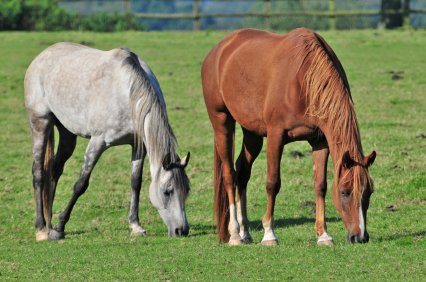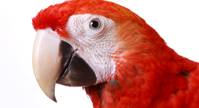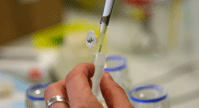Gray Coat Color / Melanoma
Description:
 Gray is the dominant gene responsible for the gradual and progressive de-pigmentation (fading) of the carrying horse. Gray cannot be considered a base-color, or a dilution, but rather a gene which slowly removes pigment from the coat. Gray is considered to be the 'strongest' of all coat modifiers, and acts upon any base-color regardless of the carrying horse's phenotype. The fading process itself may last for years, but once hair is de-pigmented, the horse's original coloring will never return.
Gray is the dominant gene responsible for the gradual and progressive de-pigmentation (fading) of the carrying horse. Gray cannot be considered a base-color, or a dilution, but rather a gene which slowly removes pigment from the coat. Gray is considered to be the 'strongest' of all coat modifiers, and acts upon any base-color regardless of the carrying horse's phenotype. The fading process itself may last for years, but once hair is de-pigmented, the horse's original coloring will never return.
Since gray is a dominant gene, where it is present it is expressed. However, the final phenotype of the carrier will vary from horse to horse. Some gray horses fade to full de-pigmentation (almost pure white) whereas others may be 'fleabitten'. Fleabitten refers to gray horses with tiny non-faded spots or 'fleabites.' The gray carrying horse may also experience de-pigmentation of the skin itself, and before skin is fully faded may display 'mottling'.
Melanomas:
Equine melanomas occur most often in gray horses, and it is expected that at least 80% of gray horses will develop melanoma. In melanomas from gray horses, both the STX17 and the neighboring NR4A3 gene are over expressed.
Most melanomas found in horses are benign - once present these benign types of melanoma are not aggressive in their growth and may progress over several years requiring little treatment. A melanoma is one of the most common skin tumors seen in a horse or pony.
Malignant melanomas in horses can cause severe problems and can be life-threatening. Problems develop when melanomas are present internally or if they become so large that they ulcerate, bleed and become infected. Equine melanomas sometimes grow so large that they can cause severe weight loss and/or colic. If a melanoma is situated on the head in an area where a bridle, saddle, head collar or rug might rub, it will be uncomfortable for the horse, potentially causing behavioral problems. Infections can also occur.
Genetic Testing of the Gray Gene May Be Beneficial for a Number of Reasons:
Breeding purposes: for those interested in specifically breeding gray foals, Homozygous gray specimens are ideal as they will always transmit the gray gene when bred, thus guaranteeing eventual gray progeny. Those looking to 'breed out' the gray modifier to gain non-fading foals may hope for heterozygous gray horses. Some breed-types have a large percentage of gray stock which through historical lineage may harbour colors and dilutions that are 'hidden' by the masking effect of the gray.
Insight into a foal's potential to fade: since gray may cause slow de-pigmentation, it may not be visually apparent whether or not a newborn foal will eventually fade to gray. The de-pigmentation process may take many years and therefore DNA testing is useful in the cases whereby a foal is born of one or more gray parents and verification of the presence of gray is necessary.
Test Results:
Animal Genetics offers DNA testing for gray factor in horses. The genetic test verifies the presence of the gray mutation and presents results as one of the following:
| G/G | Gray | Positive for dominant gray gene, carrying two inherited copies. Carrier's coat modified and will eventually become de-pigmented. Homozygous gray horses are genetically bound to pass the gene to 100% of their progeny when bred, so all foals will receive gray and fade-out. |
| G/g | Gray | Positive for dominant gray gene, carrying a single inherited copy. Carrier's coat modified and will eventually become de-pigmented. Heterozygous gray horses are statistically likely to pass the gene to 50% of their progeny when bred. |
| g/g | Non Gray | Negative for gray. Horse will not turn gray. |
Submit a Sample for Testing:
To submit a sample for testing please click on ORDER and download a sample submission form. Then follow the sample collection and submission instructions.
Cost per sample is $25.00. Please see our Equine Fee Schedule for all equine testing rates.










